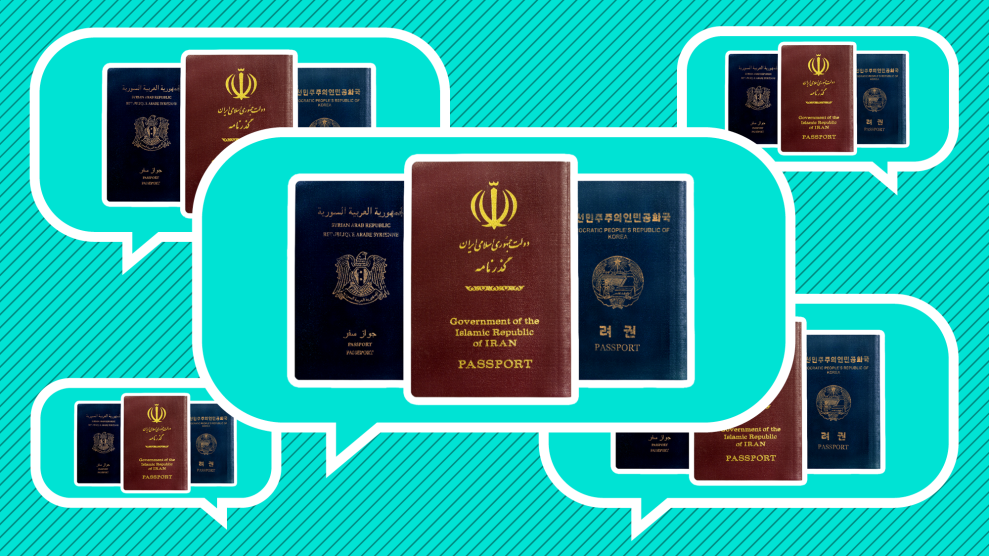
Mother Jones illustration
Editor’s Note: On the one-year anniversary of President Donald Trump’s travel ban in January, Mother Jones asked readers to share their stories about how the ban has affected them. That’s how we found Anthony. He wrote to us about being separated from his fiancé, Reza, an Iranian refugee who fled his home because the police found out he was gay. Now you can hear Anthony share details of their ordeal with MoJo’s Jamilah King on our new show, the Mother Jones Podcast:
When Tony went to Germany on a mission trip to help refugees, he didn’t expect to fall in love. And, at first, he didn’t. He also didn’t expect to get caught up in a web of international bureaucracy and same-sex marriage restrictions—obstacles made even more complicated by a travel ban implemented by President Trump in January 2017.
If Tony’s being honest, he’ll tell you he was a little scared of meeting the refugees because he had often seen people from the Middle East portrayed as terrorists in the media. But it wouldn’t take long for the programmer from the suburbs of Chicago to take notice of Reza, an Iranian refugee, who was translating a language class for other refugees while learning to speak German himself. Tony found himself impressed by Reza, who had to communicate with teachers in English to understand the lesson in German and then relay it back to the rest of the refugees in Persian. It was something like a complicated game of telephone. For an added layer of confusion, Reza spoke American English, while the teachers spoke British English.
As Reza puts it, that day in December 2015 wasn’t like a big romantic moment from the movies, but the two connected quickly. They kept talking to each other during class. “But [the teacher] needs him to translate everything into Persian, so we kept getting yelled at,” Tony laughs. “She was teasing, but she also needed his help.”
Reza opened up to Tony, telling him he had to leave Iran because his life was in danger. “I connected emotionally with him, with his story, and I think he saw me getting teary-eyed and, probably, I cried,” Tony remembers.
Reza says Tony definitely cried. “I was so embarrassed, I never tried to make him cry,” Reza recalls. “I was just saying…I don’t want you to feel sorry for me.”
But Reza left out one big detail about his story that day. He never explained why he had to flee Iran. The two kept in touch over email, and six months later, when Tony came to Germany on another mission trip, Reza finally told him: He had to leave his home because the police had found out he was gay. In Iran, homosexuality is illegal and can be punished by death.
Reza could read the shock on Tony’s face and initially feared his American friend hated gay people, but then Tony confessed that he liked men, too—and it was something he hadn’t told many people. (Both men requested we only use their first names to keep their sexuality private.) After coming out to each other, the two got closer. “We started connecting more on that level,” Tony says. “Up until then he’d just been a dear friend who felt like family, even though we were 4,000 miles apart and had only met once.”
Their relationship had a profound effect on Tony. Before, he had identified as bisexual, but never acted on his attraction to men. After being with Reza, he says he identifies more as gay. In November 2016, during Tony’s third trip to Germany, the two got engaged. Two months later, Trump issued the first travel ban. The executive order blocked people from several Muslim-majority countries, including Iran, from entering the country for 90 days. That ban is no longer in effect, but another one blocking people from Iran and several other countries from coming to the US indefinitely is now in place.
Reza couldn’t apply for a visa to the US right away because he was already in the process of seeking asylum in Germany. But even once Reza had a refugee passport in December 2017, the two knew applying for a visa wasn’t an option because of Trump’s travel ban: A lawyer told Tony a fiancé visa would almost certainly fail because he hadn’t seen a successful case of getting around the ban that way. That lawyer advised that Reza would have a better chance of getting into the country if the couple got married first because that would give him a stronger legal tie to the US.
“Even with that, the lawyer didn’t promise that it would work,” Tony says. “If we get married in another country and apply, there’s no guarantee that he’ll be able to get through as long as the ban is in place.” And getting married is a long shot as things stand now because the spouses of American citizens aren’t exempt from the ban. While a waiver process around the ban exists, only a fraction of applicants qualify, and it’s unclear what criteria the US government is using to determine who receives a waiver.
Still, the couple decided to get married before trying to bring Reza to the US, but that hasn’t been easy. Though same-sex marriage is legal in Germany, Reza doesn’t have all the documentation he needs to get married. When he left Iran, Reza had to leave in a hurry and didn’t have time to secure money, documentation, or other belongings because the police were after him. “If cops realize [you’re gay], you’re going to be hanged or, even worse, stoned,” Reza says. “Best case is, you’re going to be in prison the rest of your life.”
The necessary documents that Reza needs are a certificate of non-impediment, which declares that Iran has no information that would hinder him from getting married, and a divorce decree from his previous marriage to a woman. This documentation is required in many international marriages to prove that the individuals aren’t wed to someone else. Reza can’t ask the Iranian government for these documents because that would require him to either go back to Iran or visit the Iranian embassy in Germany. Based on its asylum law, Germany could theoretically terminate Reza’s asylum status for visiting the embassy because it could be interpreted as seeking protection from his home country—which is grounds for losing his status.
The couple has looked into getting married in other countries, but their options are limited. They need a place they can both visit, that allows same-sex marriage, and wouldn’t require new documents from Iran for them to wed. A month ago, the couple was hopeful they would be able to get married in Copenhagen or New Zealand, but Reza doesn’t have the right documents to get married in Copenhagen, and although he doesn’t need additional documentation to marry in New Zealand, he’s running into roadblocks trying to get a visa to visit. “A lot of the places that we email or we call, we just never hear back from, so there might be other options, but we don’t know yet because we don’t have answers,” explains Tony.
The changing status of the travel bans has also taken an emotional toll. “That part has just been kind of maddening,” Tony says. “You get these huge highs, like ‘we’re finally going to get to be together,’ and then it crashes down.” They’re hoping the Supreme Court overturns the travel ban after it hears the case in April, but they’re continuing to look for contingencies in the meantime. Right now, Tony is paying around $1,300 to someone in Iran who might be able to get Reza the appropriate documents. All told, he estimates he’s spent about $20,000 trying to get Reza the documents he needs to get into the US.
The nightmare the couple is facing to get Reza to the US is concerning, but unsurprising, according to Betsy Fisher, policy director at the International Refugee Assistance Project. Refugees, she says, often face bureaucratic roadblocks to getting their marriages recognized due to a lack of paperwork from the country they’re fleeing. Add on the fact that Reza and Tony are a same-sex couple, and it’s what she describes as “a perfect storm.” Even so, she points to the travel ban as the biggest obstacle in this situation. “The fundamental issue is that we have a US citizen who’s being denied the right to reunite with his family member because of a discriminatory ban that treats his partner as a national security threat despite the fact that he is fleeing from persecution,” Fisher explains.
Reza, meanwhile, is stuck in a refugee camp, waiting. “It’s dirty, it’s a disaster—you don’t want to know,” he says. For a hundred refugees, there’s one kitchen, three washing machines, and four toilets, and he describes it as a big step up from when he first came to Germany and lived in a camp with three or four thousand people. He says he can’t come out to other refugees at the camp and feels alone there, and because he’s hoping to come to the US soon, he can’t enroll in an education program and start a life in Germany. Those programs have a three-year commitment minimum. Reza has already turned down a scholarship because he wasn’t sure if he could commit to the program. For him, one of the hardest things about this situation is the waiting. “You don’t know when you’re going to see the love of your life,” Reza laments. “[You] sit there and wait for the updates.”
As time continues to drag on and options continue to be exhausted, the two are starting to give up hope. “Every weekend we probably spend somewhere between four and six hours on the phone together trying to look up backup plans,” Tony says. “Sometimes we just break down on the phone with each other and say that we can’t keep trying…we might have to just accept that we can’t be together for years.” Reza has a test to train to be the German equivalent of a registered nurse next month. If he passes the test and accepts the offer, it would be a three-year commitment.
In contrast, back in the US, Tony has a life in Illinois with a career, family, and close friends. Reza says it would be “selfish” to ask Tony to come, and worries his fiancé would be depressed in a country where he doesn’t know anyone else or speak the language.
And although Reza is thankful to Germany for giving him refuge, he feels trapped. “I don’t feel sad with Tony,” says Reza. “Thinking about Tony makes me happy. But this? Seriously, incarcerated in this place, in this country, because of the travel ban? I don’t understand it. It breaks me. It breaks my heart.”
And to Tony, the absurdity of their situation is almost incomprehensible. “It’s just ludicrous to say this guy who had to flee the country because they were going to kill him is now a national security risk [to the US] because you’re afraid that he’s a terrorist. Are you kidding me? The same people that we’re afraid of killing us, he’s afraid are going to kill him.” Tony says even though he understands that fear, the travel ban isn’t the right approach. “When we let our fears blind us to individual people…we’re failing as a country, we’re failing as people.”
Do you have a story to share about the travel ban? Tell us:
We may share your response with our staff and publish a selection of stories which could include your name, age, and location. We respect your privacy. Your email address will not be published and by providing it, you agree to let us contact you regarding your response.
Credit: Mother Jones illustration; Drazen_/Getty














